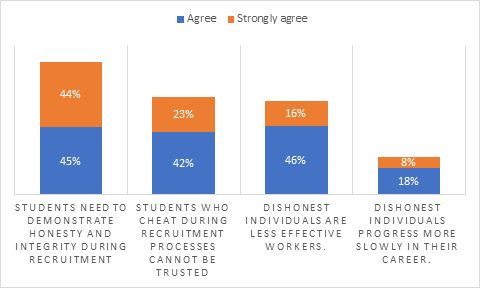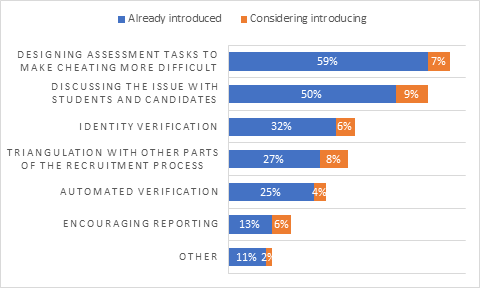ISE’s Tristram Hooley explores whether student cheating during recruitment processes really matters and asks what the student employers can do.
In our August poll of ISE members we worked with Amberjack to explore the issue of cheating in student recruitment processes.
We discovered that cheating was much more widespread than we had thought with 64% of ISE members reporting that they had seen or suspected students cheating during recruitment.
In an earlier blog with Sophie Meaney of Amberjack we explored why students cheat and noted that not all cheating is malicious (although some is). However, it is also worth considering whether this really matters.
Are the students who cheat recruitment processes demonstrating their ability to think their way around a problem? Or, are they demonstrating deep-seated character flaws?
Is honesty a virtue?
ISE members generally believe that honesty is a virtue with most agreeing or strongly agreeing that they want students to demonstrate honesty during recruitment processes. Perhaps more importantly, a clear majority believe that students who cheat during recruitment cannot be trusted and that dishonest individuals are less effective as workers.
But, concerningly they are not so certain that cheats will not ultimately prosper. Only around a quarter agreed that dishonest individuals progress more slowly in their career, suggesting that people have seen untrustworthy people getting to high places in their organisation (and perhaps in wider society).
ISE members opinions on student honesty (271 responses)

What can we do about cheating?
A lot of respondents to our poll were not sure about what to do about the cheating that they had seen or suspected. So, it is interesting to think about what other members are doing to try and challenge the cheats.
Overall a substantial minority of respondents (42%) were actively taking action to reduce cheating. This was most common amongst respondents who worked for student employers where 54% were tackling cheating and least common in universities where only 32% of respondents were taking action.
The difference in the proportions of people involved in challenging cheating is concerning. While it is right to expect that employers should be leading the charge, as it is them who are recruiting and ultimately employing students, but other stakeholders also have a role.
If we are going to successfully challenge cheating during recruitment processes it is important that everyone in the sector is aware of the issue and doing what they can to prevent it.
Given this, it is interesting to look at what the respondents who were taking action against cheating were actually doing.
Strategies taken to prevent cheating (107 responses)

The most popular approaches were designing assessment tasks to make cheating more difficult (65% already doing this or considering it), discussing the issue with students (59%) or using an identity verification system (e.g. passport and/or face scanning) (37%).
Some of these approaches are clearly the responsibility of the employer, but others, such as talking to candidates about the issue and encouraging reporting are things that all stakeholders could be doing.
The shift to increasingly online forms of recruitment and selection has opened up more space for cheating. If recruitment and selection processes are going to be fair and equitable they also need to ensure that cheating is difficult or impossible and that candidates understand the importance of demonstrating integrity through the process.
For more information see the August poll in our Reports section.


0 Comments